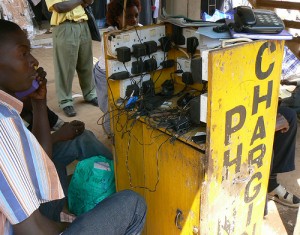I think this article from Global Voices has a great intention behind it, and is a good first attempt at creating some kind of organization of ICT blogs and sites. It observes that there are 3 catagories of people who write about ICT4D:
Excerpt from Global Voices :
- People who both understand grassroots development needs and are proficient in ICT.
- Academics who are interested in the field.
- Everyone else either comes from the ICT community, and open to designing tools for development/ social projects, or people working in the development sector who need ICT solutions but have relatively low/ no knowledge of ICT. These two sets of people do not usually speak the same language
Excerpt from Global Voices :
After several months of dedicated analysis and writing about how ICT for development is covered on the web, here are some thoughts about the online availability of information about ICT4D – from academic articles, to conversation, commentary, and citizen media reflections on what works, what’s difficult and what is worth sharing.
It is...relatively difficult to find blogs and citizen media content from unaffiliated individuals, and from those who experience the benefits, and sometimes challenges of internet technologies in developing-world contexts. While there are scattered discussions and commentaries, sustained, community-driven dialogue is not easy to find. This is perhaps not surprising, given the often complex and technical nature of the field.
There has been tremendous improvements in internet access and explosive growth of cell phones in developing world, as Matthew Smith outlines in his essay for IDRC/Harvard’s latest conference,Communication and Human Development: The Freedom Connection? in September 2009.
However, GV’s research (led by Aparna Ray and John Liebhardt) has found ambiguous evidence of online discussion of these themes that advances beyond well-worn anecdotes of fishermen with mobile phones. Those discussions surely exist, if not online; a look at the Manthan Awards in South Asia, for example, gives us a window into communities of practitioners in this field, and the focus of their work.
In general, we observed that there are several categories of people writing online about ICT4D:
- People who both understand grassroots development needs and are proficient in ICT. A very small percentage of online writers fall in this category. These people have the skills to develop tools/ techniques, speak the language of ICT4D, and are able to get exposure for their projects.
- Academics who are interested in the field. They are able to develop concepts in ICT4D, and mostly run small research projects to prove/ disprove their hypotheses, build concepts, and make predictions. There is a lot of energy here - perhaps why we saw so many research papers in our web searches. These people explore and predict trends, but are not often in contact with grassroots folks, and rarely implement projects.
- Everyone else either comes from the ICT community, and open to designing tools for development/ social projects, or people working in the development sector who need ICT solutions but have relatively low/ no knowledge of ICT. These two sets of people do not usually speak the same language.
Broadly speaking, many development experts seem hesitant to learn technical skills and languages. They may want a ICT solutions, but there are numerous obstacles to engagement, including expertise, time, resources, and organizational culture. Hence ICT experts sense that development practitioners are rarely clear about helpful solutions.


Many institutions limit access to their online information. Making this information available will be an asset to all.
ReplyDelete